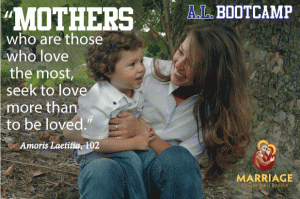 Theresa Farnan, Ph.D. is currently an adjunct member of the philosophy department at Franciscan University of Steubenville and a consultant to the USCCB Committee on Laity, Marriage, Family Life and Youth. Find more of her work on her website.
Theresa Farnan, Ph.D. is currently an adjunct member of the philosophy department at Franciscan University of Steubenville and a consultant to the USCCB Committee on Laity, Marriage, Family Life and Youth. Find more of her work on her website.
With the publication of Amoris Laetitia (AL), Pope Francis offers some timely thoughts on the importance of both mothers and fathers for families. He begins his meditation on “the joy of love experienced by families” (no. 1) by painting a vivid picture of family life. “At the center, we see the father and mother, a couple with their personal story of love. They embody the primordial divine plan clearly spoken of by Christ himself: ‘Have you not read that he who made them from the beginning made them male and female?’ (Mt 19:4)” (no. 9).
Francis reminds us that the “deepest reality” of human couples originates with sexual difference – “it is striking,” he notes, “that the ‘image of God’ here refers to the couple ‘male and female’” (no.10). The fruitful, life-giving love of a man and woman gives rise to the family, a “living reflection” of the “communion of love” that is the Trinity (no. 11).
Throughout Amoris Laetitia, Francis strongly reaffirms the importance of sexual difference as the foundation of marriage, lamenting the “failure to realize that only the exclusive and indissoluble union between a man and a woman has a plenary role to play in society as a stable commitment that bears fruit in new life” (no. 52).
In fact, Francis notes, every child deserves to be loved by both mother and father. “The love of parents is the means by which God our Father shows his own love,” not just individually, through each parent’s love for his or her children, but together, as a couple whose love for each other is the foundation of the family (no. 170). Husband and wife, father and mother, both “cooperate with the love of God the Creator, and are, in a certain sense, his interpreters.” Together “they show their children the maternal and paternal face of God” (no. 172).
Mothers and fathers have different relationships with their children. Pope Francis, in a beautiful tribute to mothers, praises their warmth and their tenderness, their dedication and moral strength, all of which help the child “develop a capacity for intimacy and empathy” (nos. 174-175). Fathers are equally important, mediating between the child and the world, helping the child “to perceive the limits of life, to be open to the challenges of the wider world and to see the need for hard work and strenuous efforts” (no. 175).
Francis laments individualism that sees motherhood as a threat to women’s freedom, and offers men a confused understanding of masculinity that devalues fatherhood, commitment, and responsibility (see nos. 173, 176). At the same time, he rejects a rigid division of roles and responsibilities, reminding us that it is the “clear and well-defined presence of both figures, male and female” that best allows children to flourish (no. 175).
In his discussion of the importance of the presence of mothers and fathers, we can see the unique stamp of Francis’s pastoral theology of accompaniment. The family – founded on the loving union of a man and woman – is the primary school in the art of accompaniment, where a child is loved and learns to love.
Leave a Reply